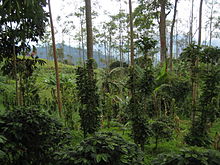
A | B | C | D | E | F | G | H | CH | I | J | K | L | M | N | O | P | Q | R | S | T | U | V | W | X | Y | Z | 0 | 1 | 2 | 3 | 4 | 5 | 6 | 7 | 8 | 9

Sustainable agriculture is farming in sustainable ways meeting society's present food and textile needs, without compromising the ability for current or future generations to meet their needs.[1] It can be based on an understanding of ecosystem services. There are many methods to increase the sustainability of agriculture. When developing agriculture within sustainable food systems, it is important to develop flexible business processes and farming practices.[2] Agriculture has an enormous environmental footprint, playing a significant role in causing climate change (food systems are responsible for one third of the anthropogenic greenhouse gas emissions),[3][4] water scarcity, water pollution, land degradation, deforestation and other processes;[5] it is simultaneously causing environmental changes and being impacted by these changes.[6] Sustainable agriculture consists of environment friendly methods of farming that allow the production of crops or livestock without causing damage to human or natural systems. It involves preventing adverse effects on soil, water, biodiversity, and surrounding or downstream resources, as well as to those working or living on the farm or in neighboring areas. Elements of sustainable agriculture can include permaculture, agroforestry, mixed farming, multiple cropping, and crop rotation.[7]
Developing sustainable food systems contributes to the sustainability of the human population. For example, one of the best ways to mitigate climate change is to create sustainable food systems based on sustainable agriculture. Sustainable agriculture provides a potential solution to enable agricultural systems to feed a growing population within the changing environmental conditions.[6] Besides sustainable farming practices, dietary shifts to sustainable diets are an intertwined way to substantially reduce environmental impacts.[8][9][10][11] Numerous sustainability standards and certification systems exist, including organic certification, Rainforest Alliance, Fair Trade, UTZ Certified, GlobalGAP, Bird Friendly, and the Common Code for the Coffee Community (4C).[12]
Definition
| Agriculture |
|---|
 |
|
|
The term "sustainable agriculture" was defined in 1977 by the USDA as an integrated system of plant and animal production practices having a site-specific application that will, over the long term:[13]
- satisfy human food and fiber needs
- enhance environmental quality and the natural resource base upon which the agriculture economy depends
- make the most efficient use of nonrenewable resources and on-farm resources and integrate, where appropriate, natural biological cycles and controls
- sustain the economic viability of farm operations
- enhance the quality of life for farmers and society as a whole.
Yet the idea of having a sustainable relationship with the land has been prevalent in indigenous communities for centuries before the term was formally added to the lexicon.[14]
Aims
A common consensus is that sustainable farming is the most realistic way to feed growing populations. In order to successfully feed the population of the planet, farming practices must consider future costs–to both the environment and the communities they fuel.[15] The risk of not being able to provide enough resources for everyone led to the adoption of technology within the sustainability field to increase farm productivity. The ideal end result of this advancement is the ability to feed ever-growing populations across the world. The growing popularity of sustainable agriculture is connected to the wide-reaching fear that the planet's carrying capacity (or planetary boundaries), in terms of the ability to feed humanity, has been reached or even exceeded.[16]
Key principles
There are several key principles associated with sustainability in agriculture:[17]
- The incorporation of biological and ecological processes such as nutrient cycling, soil regeneration, and nitrogen fixation into agricultural and food production practices.
- Using decreased amounts of non-renewable and unsustainable inputs, particularly environmentally harmful ones.
- Using the expertise of farmers to both productively work the land as well as to promote the self-reliance and self-sufficiency of farmers.
- Solving agricultural and natural resource problems through the cooperation and collaboration of people with different skills. The problems tackled include pest management and irrigation.
It "considers long-term as well as short-term economics because sustainability is readily defined as forever, that is, agricultural environments that are designed to promote endless regeneration".[18] It balances the need for resource conservation with the needs of farmers pursuing their livelihood.[19]
Zdroj:https://en.wikipedia.org?pojem=Sustainable_agriculture
Text je dostupný za podmienok Creative Commons Attribution/Share-Alike License 3.0 Unported; prípadne za ďalších podmienok. Podrobnejšie informácie nájdete na stránke Podmienky použitia.
Antropológia
Aplikované vedy
Bibliometria
Dejiny vedy
Encyklopédie
Filozofia vedy
Forenzné vedy
Humanitné vedy
Knižničná veda
Kryogenika
Kryptológia
Kulturológia
Literárna veda
Medzidisciplinárne oblasti
Metódy kvantitatívnej analýzy
Metavedy
Metodika
Text je dostupný za podmienok Creative
Commons Attribution/Share-Alike License 3.0 Unported; prípadne za ďalších
podmienok.
Podrobnejšie informácie nájdete na stránke Podmienky
použitia.
www.astronomia.sk | www.biologia.sk | www.botanika.sk | www.dejiny.sk | www.economy.sk | www.elektrotechnika.sk | www.estetika.sk | www.farmakologia.sk | www.filozofia.sk | Fyzika | www.futurologia.sk | www.genetika.sk | www.chemia.sk | www.lingvistika.sk | www.politologia.sk | www.psychologia.sk | www.sexuologia.sk | www.sociologia.sk | www.veda.sk I www.zoologia.sk
